
CHRONICLE SIXTY-TWO, Unchronicle II,
Part I,
THE CHRISTMAS PRODIGAL

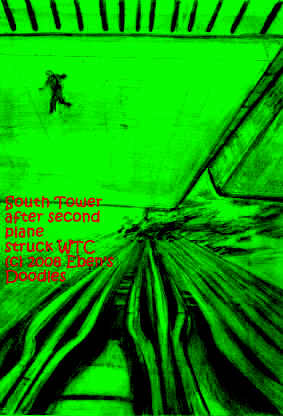
In cyberspace, Ero the Olympic Torch Bearer turned Alien Entity-challenger was given a ringside view of the catastrophes, as his flying dome zeroed in on the site of what was to be called Ground Zero. He flew up while the Towers were still standing, burning from the top down for a number of floors, but still stupendous and impressive as the once tallest buildings in the world, which these were until surpassed by the Sears Tower in Chicago.
The South Tower, though mortally struck after the North Tower, was first to collapse. Yet who could foresee it? It had to happen to be believed. It was unthinkable until it fell and bit its own dust before the eyes of the watching, horrified world. And the people inside the doomed Tower were just as incredulous, that anything like that was going to happen to it, and to them. But for the souls caught above the second jet's impact zone, it was a little more desperate in appearance. Smoke and fire were driving them outward, to gasp for air at the windows, which they broke out to escape the toxic fumes if they could.
Once they had done that, it was impossible not to look down to the ground, if they could see it at all--far, far, far, far below--almost a thousand feet below their frantically searching eyes, in fact. Was there anyone coming to rescue them? Where were the helicopters? The phone lines were jammed, the cellphones useless in their hands, as they kept punching numbers or redial. But some reached home, or loved ones, or 911, for all the good that would do. They could only scream, or cry, or--if they mustered the emotional control-- cooly recite their own epitaphs: "I am on such an such number floor, waiting for someone to come and get us down from here." Or, if less controlled, voices shouting or screaming about fire, smoke, at the window, trapped, no one coming. The voices got more frantic as the people became more hopeless. "Is anyone coming? Gotta get out of here soon--flames, smoke, it is too hot to stay here, I have to--"
And then, facing tsunanmi-like, moving walls of approaching flames and smoke, they had to scream or shout their last words and goodbyes, throw their useless cellphones away, and start, Lord have mercy, jumping. It was better to jump than burn alive. Right? Was it really? They didn't have time to meditate on their choices. The all-consuming firewall, billowing and shapeshifting into a roaring dragon, was coming at them with a fury--burning ferociously hot, its nostrils emitting flame and smoke like blast furnaces.
People further from the windows were being caught in it, toasted black, incinerated before their eyes, when they hestitated jumping and tried to run back through the flames to try and get to the stairs.
Jump! Now! Don't burn like that!
Try make a decision like that: It isn't rational, there isn't time to think, fear is pounding like jackhammers in your heart and ears and your skin feels like lead on your arms and legs, electric lead, somehow liquid, covering you, yet vibrating your bones into jelly--shaking you and paralyzing you with dread--yet... Don't burn like that! Jump out! NOW! That was what their instincts demanded (overriding their sense of self-preservation or fear of heights, even this height they were at), or be burned to a crisp in a second!
So they obeyed, heaving their fear-paralyzed bodies like solidified sacks of readi-cement out the windows somehow, and when falling, falling, they began to face that they were already dead, even as the ground, all too soon, rushed upwards with a terrific noise and wind at them, as if they were hurled through a wind tunnel turned on end. It wasn't fair, they were only office workers at their jobs--who did this to them? But all that didn't matter now! They were going to smash up just the same.
They knew only one thing--not their murderers, not some court trying their case, not some judge awarding punitive charges on their behalf, not some Congressional board of inquiry droning on and on in Washington about the incident, no, none of that: they simply had to now face whatever it felt like to impact the cement on the ground. Flesh against cement, blood against stone--bone? It was instantly pulverized, their blood spraying out like a fountain, their whole physical form dissolved into a collapsed blob that had once been a human being, with a name, a career, a family, a future, and...it was all nothing now, but a blob in a pool of blood on the ground, which people were screaming at and trying to run around to get away from as quick as they could. It is not a pretty thing to see fellow human beings, all sizes and ages, drop and smash on the cement of the World Trade Center Plaza like so many eggs from the upper floors of the Towers--pop, pop, pop! Viva Osama bin Ladin! Happy news is on the way to cheer him. It will exceed his highest expectations. His wives, Zuhrah, Fatima, Gubdugah, Beepee, Shellah, Oila, Lubricatah, Filippasixtysixa, and all the others, tattooed damsels in his harem, will be so happy for him, and give him many more children to add to the 22 (at last counting) he already has in his quiver. They will dance and sip Coca Cola with gold and diamond-studded straws and ululate until the wee hours of the night! How the Americans will be humbled when they see their towering, gleaming WTC destroyed--the fabulous New York in shambles and a mass panic, and Washington too aflame with the Capitol and Pentagon destroyed and five-star Pentagon generals running hatless down the streets after their screaming secretaries who aren't in better shape but have just had skirts burned off their big, fat, milk-white American buttocks!
They brought it all on themselves, after all--defying Allah the Compassionate, defying His Prophet, for whom Saudi his motherland was holy and inviolate, until the Infidel Americans had come, his country betrayed by the king, and set up their military bases, contaminating holy ground with infidel feet, urinating on the Sacred Motherland as they stood, feet splayed far apart like like a rutting camel's, and sprayed the whole countryside!
This smashing and burning of the WTC was just the start of what he would do to them, to drive them out of Saudi, back to their nasty holes, and leave Holy Saudi alone forever! This was just the beginning. After all, the Americans themselves, many of them in the universities and in the media, said they were deserving of such a thing as this for America's alliance with the Little Satan of Israel and its terrible mistreatment of the poor, helpless Palestinians (though Palestinians were donkey dung, not much better than infidels, fit only to be trod underfoot)--so, Allah be praised, he was only giving them what these infidels, pigs, and monkeys, said they wanted, said every day on American TV they all deserved.
So for Ero the Torch Bearer, the wannabe but never-will-be Olympic champion, it's off to Atlantis II on the Re-located Earth! Rather, it's Kastorr, Wally's Cyberspatial version of it. Or to be more precise, it's the Carbuncle, with the Sea of Doubt-encircled palace-residence of the Vampire, its eyes whirling within with a photo-celled universe made up of things that never happened.
But the entire thing is based on an option, a road not taken by Ero--remember? He didn't choose to pick it up, so none of the following actually happened to him. Yet that is not to say the events are not important--far from it! It is an incontrovertible truth, a foundational truth, that things that do not happen are often more important and lasting than things that do happen. Ask any man who forgets to remember his wife's birthday or their anniversary. That fatal lapse, his failure to do anything, will never be funny or amusing to her. She will never let him forget it either. She could possibly forget his card and flowers and other endearments, if he had done right by her, but she can never forget what he did not do on that particular date. Things undone are often unalterable, or unforgivable. They work lasting, even eternal effects.
So too with the road not taken, the option not chosen. Life for most everyone is full of such roads and options not taken or chosen--and we all live with the unpleasant, serious to fatal consequences. They are most often unavoidable consequences, made worse because we cannot see the gigantic engines of nothingness, of anti-matter, producing all the evil that is ruining us in this other dimension--just because we failed to do something! It doesn't seem fair to us--but when is the Universe fair? It's unfairness, its inequality, is probably the kindest thing in the Universe, producing the most good eventually--since we could all be equally poor, or equally miserable, or equally stupid at the same time--and then what good could possibly come from that?
Unfairness is a wonderful thing and equality (as equality is enjoyed by pond slime algae, every alga the same in the same circumstances) is hell for intelligent, sentient beings. So let the Universe continue to operate unfairly, if we know what is good for us.
It is the thing we choose not to do--that is the real hitch, the thorn in the Rose of life, the rub, the fly in the ointment. Like the aboriginal boomerang, it will come round to, not just haunt us, but knock our silly heads off! Boomerangs, after all, were not playthings. They were used to hunt wild game like roos, emus, and wombats. That brings us round to Ero, who is winging down via his cybersptatial argosy, his own personal Argo, the detached mast from the Union Station Dome.
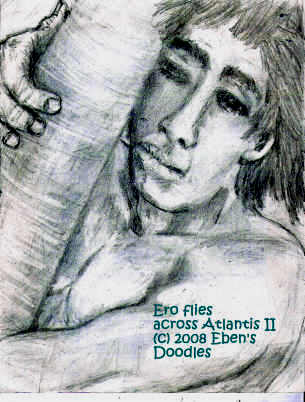
The Tea and Sugar, a mixed-goods train delivers track supplies and transports work crews called fetlers, as well as pay to other train maintenance people at small depots and settlements strung along the 1,000 plus miles of track.
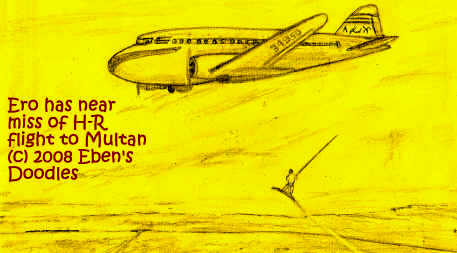
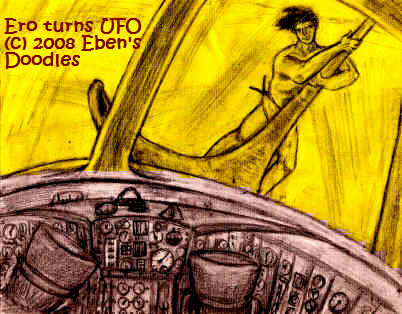
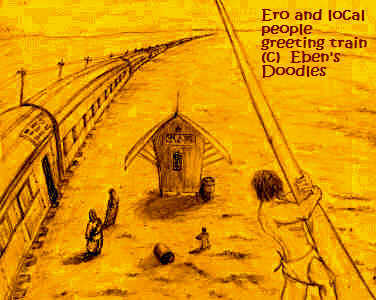
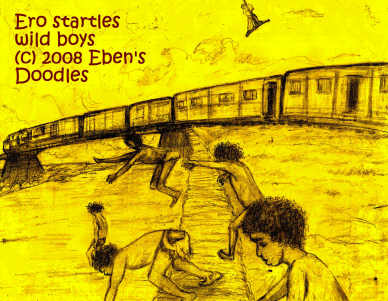
He had done his homework on this southermost stretch of country and its one highway, the double gauge track, that carried travelers 310 miles without a single jog. Normally, there should be few surprises--but somehow Damon wasn't so sure this time.
Geologists and cartographers knew it technically as the South-Eastern Erg, but the people who actually live there, suffering the hellishness of it, call it by name, perhaps hoping to personalize it a bit and make it a little more bearable.
After all, humanity has that trait, naming things to better get control of them But the Nullabora, controlled? Damon thought. What a silly idea. It can only be endured, with the patience of a hapless lizard that ran too far after a fly, and now is frying out in the open on sizzling hot hardpan, its sightless eyeballs shrinking and blackening in their sockets. The lizard controlled nothing, after all, and the fly got away, flying and buzzing about until he eventually ran into a smarter lizard.
A free-roving photographer for the Poseidonian Government Tourist Office, this isn't his first trip photographing the world from a train--but he knew the Tea and Sugar on the uttermost southern edge of the continent would be different from the other stretches of track and their mountain-climbing narrow gauge rails. The Herukan-Ratnan authorities, anxious to gather tourist revenues from this vast wasteland to help pay for its upkeep, issued visas to Publica-texans and other rich "Outlanders," but that did not mean they would not plant a spy or two aboard the train, just to keep their activities in view. Photographers, as a tribe, have an innate sense about such things, and so it proved, the moment he climbed aboard at Port Olu (also called Port Abdullah, "Ulla" or "Olu" for short), he suspected, way down in his gut, a sea-change was in store for him in the itinerary. A railway in such a depopulated, barren wilderness as the Nullabora was bound to collect some strange types, he knew. They were the detritus, the flotsam and jetsam, of society, washed in by hardship and bad times somewhere else where they could no longer afford to live, or maybe they were even just one step ahead of the law, fleeing from the authorities after some murder or robbery?
The train carried the usual consignment of railway workers, and common contract laborers, the "fetlers," but there were passengers, second class and even a few first class fares like himself.
First class proved a crashing bore, he soon found, the usual wealthy foreigners, over-dressed for the Nullabora, stuffing in too much rich food than was good for them.
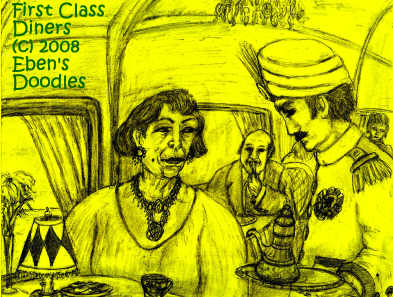
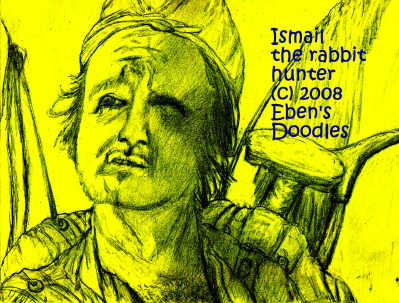
"Oh, it's a bloody life, mate! My peg leg hurts something bloody awful at times, as if I still have a leg there! I can hardly sleep at times, but I can't help having it along, I have to walk on somepin! But the skins are good here--the best on the market in Port Ulu! They pay me well there! I make my trip in every couple months, with all I collect (dried to toast by this bloody sun and wind out here), and get my pay, and head for the bloody Rabbit and Wolf Club in town, and when I wake up a couple days later wherever they happen to throw me--I always search for my secret stash in my wooden leg, and, sure enough, they hadn't thought to look there! I made too many mistakes losing my money to the bouncers at the bloody club--so I learned, and made my secret hideaway, and save what I need to return to the bloody Nullabora and start over!"
"But what are you going to do, when you're too old for roaming around alone?" Damon burst out. "Who's going to take care of you in your old age? What then, mate? Have you got any money saved for that eventuality?"
Ismail grinned, drew a glass flash out of his shirt, and offered Damon a swig. Damon smiled, shaking his head, and the rabbit-hunter uncapped the flask and took a draught, wiped his lips afterwards with his dirty back hand, and put the flask back.
"Oh, that! Hey, luv, I donna worrie 'bout things to come--I just live now, this bloody crook day, not tomorra, mate! I only got todayya!" He laughed, throwing his head back at his own witicism. Damon had to laugh too. The man's merry laugh was infectious. Since that was about as good a explanation as he had heard from others like him, Damon wished him good fortune with the rabbits and their skins and went back to the car, to finish his picture taking. He knew that the rabbit-hunter was just making a brave face for him, as both of them knew his fate: someday, maybe not long from this day they rode the Tea and Sugar together, his bones bleaching out on the endless plains somewhere amidst the salt pans and salt lakes and rocks and lizards, his death unnoticed and his grave unmarked.
The Second Class compartments were jammed, of course, presenting the starkest contrast with the quality folks in the First Class cars. But here was life! Life in all its rawness, desperate need, and primitive, tooth and claw struggle, with survival of the fittest, that is, the most brutal and violent elements--just the thing he wanted for his spread on the Nullabora and its inhabitants, animal, vegetable, and human.
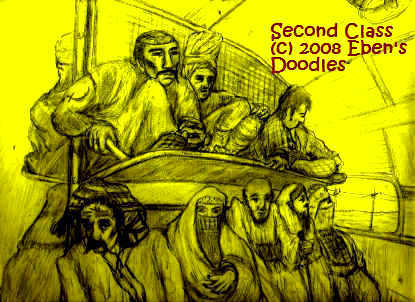
Damon took a group picture, wondering how he would engage any of the men and women (he saw few children), as they were all withdrawn into themselves, avoiding conversation with each other while they endured the long, long, monotonous rail trip to the single-gauge transfer depot which served as the entry gate to the Mountains of the Moon (the notorious border country of Ratna and Heruka where people could escape the government authorities indefinitely, if they could find some means of sustenance in the free and lawless mountain towns and villages).
Damon, experienced as he was, and no fool, was always on his guard, however. There was safety on the train--sort of. Robberies and murders still took place, despite the guards and the capital punishment they administered any malefactors in transit. Seldom patrolling the dangerous corridors, their justice was sporadic and quick but little enough administered to strike any real fear into the troublemakers onboard.
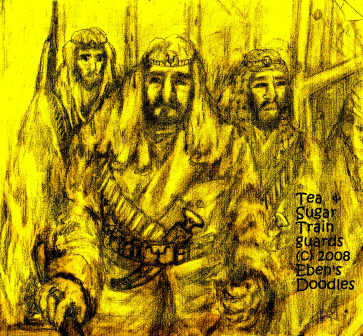
Knowing all about this, but reasoning that they, as train personel, were at lowest risk of being made targets, kitchen scullery workers still took their vegetables and fruits and other menu items out to the area between the cars, when they wanted some space to work they couldn't find in the boiling hot kitchen. This was not particularly foolhardy. Normally, during the day there was little danger of being assaulted. But one worker, paring sweet potatoes and yams while he daydreamed about his sweet little bride to be waiting for him at Port Yosef, let down his guard a bit too much, perhaps.
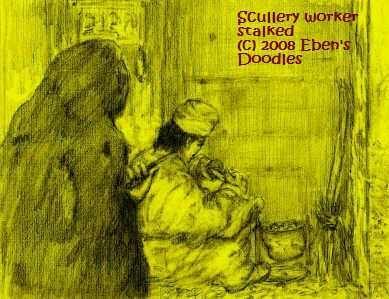
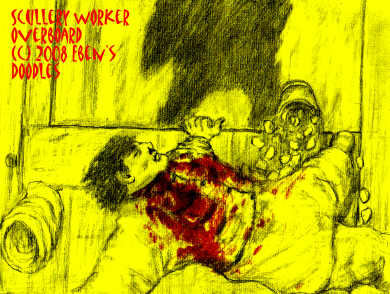
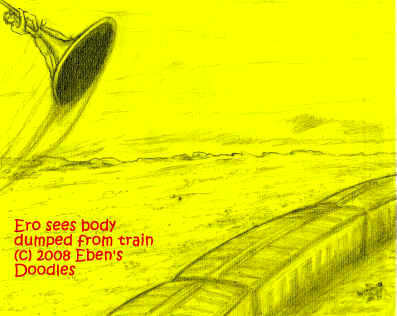
Though he did not hear about the scullery worker's disappearance, already Damon had noticed a considerable thinning out of passengers in some compartments, where he spotted the roughest looking blokes. Why didn't the other passengers report the killers? Of course, there was only one reason: they would be targeted next by the cutthroats aboard. It was best, smartest, to keep silent, and hope to go unnoticed until they reached the transshipment center, Port Yosef.
But the padre did not seem to mind the stares or the hostility of some toward infidels and foreigners, or even the threats of an occasional iman passing through, for he was an amiable man, grinning ear to ear as he greeted people and tried to get them into conversation on spiritual needs they might have.
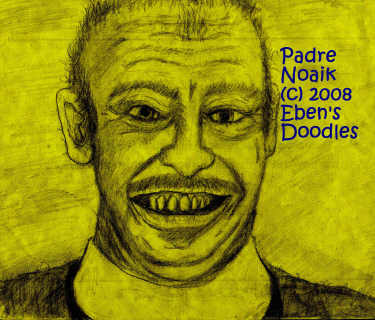
Damon had to ask him how the Gospel was doing lately. "Had any converts, Padre?" he
inquired.
"No, not this trip yet, but there are a few onboard I am working on--they'll come bye and bye--if not this trip, then the next. I feel
it is just going to happen, I see it in their eyes, mate! They can't hide it from me. They're seeking the truth!"
Damon chuckled. "My, you missionaries don't give up easily, do you! What keeps you going like this, year after year! You might be retired, at your age, sir, and take life's comforts,
if you have a wife and home, that is."
The missionary shook his head. "No, our order is completely celibate, we don't marry while we wear the Cloth, and it is a good thing too. You can't do what I do and have a sweet, little wife pining away at home for you, and this keeps me
from thinking that way too and wanting to get this business over with as soon as possible so I can scoot back to the lovin' arms of the good wife! No, this is the best way for me! I've lived all my life this way--and the end is soon coming--I can see the Celestial City shining just up the track! Until then, just me and Y'shua and the Word! My job is to meet as many people asd I can, even if only once. That way they can't say to the Lord, 'I didn't have a chance.' I tell the lads that when I go to heaven I'm going to tell Y'shua, 'I have a whole string of lads from along the line, and they want to come in too.' They listen to that. I think rough men can be softer inside than a woman. They know everything is crook, and it shouldn't be that way. I tell them, 'You keep on the rails, and you'll get there.' to me, the line is holy ground."
Damon nodded. "I can see you do find your calling fulfilling. It is written all over you--you're happy. Few men can claim that--happiness and fulfilment!"
Damon's eyes grew more sober and he looked away toward the
Nullabora. "I am not certain even I could claim that, and I have everything I want and money can buy!"
Padre
Noaik did not miss a beat, the moment Damon admitted he was not as
assured of his happiness as his manner would have people believe. He stepped closer to
the photographer, helping him as he gathered up his gear. "We should talk, soon as you
get your pictures. How about it? I can be of help, if you care to take the time."
Damon shrugged. "I wouldn't want to waste your valuable time, Padre! I have no problems--none that I can't handle. It's just that I feel a kind of empty feeling, no matter
what I do, or how many pretty women I take to bed, or how many drinks I put away--that empty feeling nags me each time, and I can't seem to make it go away. Have you got any medicine for that?"
Padre Noaik smiled. "Well, now, I got just the thing for you--no medicine, but it's the real cure for the heart and soul: the Word, Y'shua himself! He only can fill that place in you that is aching and crying out inside you like that. You see, son,
there is a God-shaped hole in every human being's heart that only Y'shua can fill. It takes a long time for some to find it out. I am here to tell you how to fill it. So as soon as we can talk, I will give you all the Word you need to know, so you and Y'shua
can get together! Okay? You'll never regret it if you do! I can promise you that, lad!"
Damon, stiffening his resolve, once he had all his equipment in hand and was ready to make
his invasion of the fetler's quarters, smiled. "Well, maybe! I didn't commit myself,
so we'll see how this session goes. If it goes well, then I can spare you five minutes or so. Is that a deal?"
The padre slapped Damon's shoulder. "Fair enough! I'll pray for you, that you have a good session. And a good session, is that you come out of this alive, with your pictures and camera intact!"
Damon laughed. "Thanks, I'll need your prayer then! I hear from everybody this is a pretty rough and nasty bunch! People tell me that when they're not working, all they do is fight, drink, and fight again! Nothing but
animals and low life--but ought to give me some interesting pictures, if I can get them
to cooperate, that is!"
That said, Damon was about to knock, when the padre caught his hand. "You think you're dealing with gentlemen? You bloody knock like that, and they'll give you a bloody fist in the face when the door opens. That's just for laughs, for openers. No, if you value your life, son, just push right in like your're somebody big and important on the Tea and Sugar line, and then just set up and start taking pictures, and boss them around too some so they respect you. They'll not bother you much then, and think they might get some nice free cold drinks out of you, if they let you do your thing. I know these boys, been
working with them for years. I would introduce you to them first, but they won't care
a fig about your credentials, son--for if I do that, then you're just a nabob in fine clothes and got a good job and money they don't have, and they'd just laugh in your face, then throw you and your camera out after smashing you up a bit for fun just to teach you not to meddle lightly with fetlers.
No, the only way for you is to bluff 'em, push right in like a big boss, and don't let them
think twice about you."
Realizing the padre knew the fetlers better than anyone, Damon's jaw tightened, then
did as he was advised. The moment he was inside the fetler's car, Damon was
distinctly aware he had landed in a no-man's land, in a kind of zoo or even a wild animal's den, where the laws of
civilized society, even as relaxed as they were in Second Class, did not apply at all here. He was on his own! Anything could happen to him! He could fight, yes, but
with so many, would he get out alive?
The dim, smoke-clogged air stung his eyes, and then he saw that the room was packed by bodies of young, unwashed, utterly debauched "lads," most of them playing pool or drinking or
lying in vomit on the floor, as his nose already told him--too many for that small a space, too,
crammed in with too many beer cans and bottles and butt cans and half-eaten meals
thrown in a corner,
the smell of spilled, stale bread malt beer blending with the reek of an over-flowing toilet and
rank human sweat.
Going to his own room in First Class, he was showering and trying to clean himself of the reek of fetler's den when he felt the train slowing.
"What depot next was it?" he idly wondered. He didn't have his map out--so he wasn't at all sure. How about a repeat of the last stop, a flyspeck of a depot called "Forest"? Whoever named it that was drunk. It wasn't but a few thorny bushes, termite mounds, and
salt, aluminate pans glaring in the sun for miles into the distance! Why risk it? Would he bother going out now that he was
feeling in urgent need of some relaxation in the diner and the adjacent "refreshment car," as the train's unregistered saloon was called? Why bother getting all his gear together,
pulling on his clothes, and going out again--he had done some real slumming to get some good pictures of the fetlers, and could
take a nice little breather, couldn't he?
Yet a free lance cannot afford to pass up opportunities, particularly on such a long and monotonous stretch as the Ulu to Port Yosef line! He knew that, so he groaned and quickly
rinsed the scented soap off, used plenty of fine, freshly laundered cotton towels, and jumped into his clothes, grabbed his equipment, and got off with the disembarking passengers.
He just caught sight of a tattered dustcoat and white clerical collar as they vanished round a corner of the first of
few low-slung bungalows, tin-roofed houses of railway workers that constituted the metropolis of Pimba, population fifteen.
Hurrying to catch up, he wasn't fast enough, he found, for
the missionary was no where in sight when he was standing on the depot town's
main street. He could take in the entire street with a glance, for the entire
road stretched not quite a quarter mile to where a sandy, tire and can-strewn playground was
started but not finished, the desolation not quite relieved by a brightly painted
red and green striped water tower that supplied the flyspeck town's
people and kept alive a few struggling palm trees, vegetable gardens and whatever livestock and chickens were
sheltered from the blasting heat and wind of the
Nullabora by high walled yards.
Two of the houses caught his attention, however. One was an unregistered watering hole, an illicit tavern, which the authorities winked at for a certain sum, of course. He knew this was the business at hand when the door flew open, and the proprietor in a dirty apron and a upper body showing the hairy pelt of a black bear roared, hustling
a no longer solvent and paying patron to the street.
Damon went over to the fetler lying prone and unmoving, and
thought he might try to help him. "Hey, you, are you all right, mate?" he asked,
touching the fetler's arm. The fetler didn't move, so he asked agin. All of a sudden
the fetler came back to life, but Damon's concern wasn't reciprocated with gratitude. All he got was a curse, and
some spit, as he bent over the fellow. Leaving him alone to lie in his
wretched state, Damon continued on, wiping his face with his clean handkerchief. Why kick a man when he is down? He couldn't do that--he has his own pride to think of!
"Imagine that? Spit on by such low, dirty scum as that fetler!" he thought, as he continued
down the only street in town. "What he didn't do for a good picture!"
As Damon left, the fetler, minding his own low reserve of pride,
hauled himself up and sat. He then rose to his feet, almost fell over on his head,
but caught himself somehow. Brushing some sand off his face, he started
hobbling back toward the tavern, then paused. His fists were clenched for action,
and he has his knife stuck handily in his ankle sheath, but he decided he might
wait on vengeance a bit--until he could walk better, that is.
Instead, he continued on by the tavern and on down the street, his
feet stepping where the photographer before him had stepped, more or less.
He knew the way by heart, and could find it with his eyes shut. She had always
been there waiting, with her delights to be paid for, one by one. Most times she
took his whole check, cashed it herself by going to the paymaster, when she took his and
a stack of other fetler checks in.
He knew she put out for all the others, just as she did him, but
he tried to forget that. But would she remember all the good pay he had
showered on her the last two years? Didn't she owe him something for that?
Wouldn't she give him a little love on credit? He had had plenty booze.
He just needed a little love right now--just a little lovin'.
So Eryk made his way to his trackside lover's domicile.
He turned in at the gate, knocked the code that alerted the dragoman
a patron of long standing only knew, and the
dragoman opened up at once.
The dragoman's glance was not so friendly, however, and
Eryk, even in his bedraggled, sodden state, could see that much.
"She home? Well, then, get outa the way! I'm goin' in!"
he said, and went forward, or sort of fell forward, then got
his balance again somehow, and continued to the door.
Going in, he found his old lover where she was usually to be found.
It took a few minutes, but he wasn't getting anywhere fast,
when she pushed him away and got up and went to the window, as if
to call the dragoman to come and throw him out.
"Wad'z the matter, babe?" he said.
"What's the matter?" she echoed him. "What's the matter? You're the matter! You're too drunk to even walk straight!
And where's your money? Tell me, did you bring any money, then where is your check?
Show it to me first! You get nothing from me without cash or a check!"
The fetler tried to get off the bed, but wasn't making much headway.
"Aw, don't you start that, woman! You know me! I pay good money!
You know that! Why treat me like a dude? I'm a--"
She turned around, spitting out the words. "You're getting out of here, right now!
I can smell it! You're flat out busted, aren't you? What I heard was true then--you're
on the Tea and Sugar blacklist! The company will never hire you--you're a dead man! They were tired of paying you for the trouble you caused them all the time. You piece of garbage, you
lying little animal--now you come here, after pissing in your pants, and you want something for nothing! You think
to use me like a little fool, do you?"
There were other, more choice things she added to her list. But she was interrupted. There was a knock on the door, unlike any heard before in the house.
It rang right through from the entrance to the back room.
It startled them both.
The lady of the house went to the door, opened slowly, and her eyes met with someone she hadn't seen before.
He seemed to be a mighty fine prospect, by the looks of him, and she
was interested immediately. There still might be something for her that day that would please her, for all the trouble she had just endured with the "reeking piece of
garbage" that was the down and out fetler!
A few minutes before, as the fetler turned in at his lover's door, Damon was about to reach the last residence and turn around, to return to the train,
when he took a second look--the particular house he was examining was
high walled like the rest. But Damon's eyes were particularly sharp, and what made this one different, it had a gate guard, of sorts, who was
at that moment examining Damon head to foot, through the big door's judas
window. "Well"? Damon asked, a little annoyed by the beady-looking, ratlike eyes. "Do you
find me interesting, mate?" he said. "Or don't you have anything better to
do than stare at strangers in town?"
The rat eye in the judas did not waver. But a very dirty thumb appeared round the
edge of the gate, which was ajar, and with a jerk indicated the direction of the house in a
way that told Damon this was the kind of house that offered a certain pleasure to
the weary traveler. It was, Damon knew from experience, the sort that any man with sufficient money could buy.
The moment he passed through the gate, it slammed shut with a horrible creaking sound and clatter of chains and locks. The gate man, really a dragoman in striped green and red pantaloon costume and high, badly stained
red turban with dirty egret feather, not to mention the long curving sword at his belt,
led Damon toward the entrance of the house.
"She's puttin' out royally today, Effendi. Tea and Sugar's here for one hour doing retail and
paying out fat checks to the workers--plenty time
for what you're be payin' for." As long as you keep payin', she'll give out, and
you can stay as long as you like, Effendi!"
Then the dragoman slouched away toward a snarling dog, sore-covered, almost hairless wolfhound which was
chained to a tree. "And if you don't leave when your money runs out, Effendi,
well, me and this doggie here will see you do right by her! And I got the key to
the gate, remember. I'll let the beast gnaw your bones right to the marrow! He's always mighty hungry, that one! Hasn't gnawned a fine gen'lmun like you for quite some time!"
Going forward, he reached the door, and just then it slid partly open, and
Damon paused, watching as the woman of the house came into view.
She had a plan of her own, and led him right to the
back bedroom where an unwelcome guest was waiting impatiently for them, and ready to pick a fight.
The fetler, though he saw immediately that he was facing a much bigger antagonist than he had bargained on,
stood his ground, leaning casually against the high bedstand (you
might say for support).
Damon waited as he heard them exchange parting obscenities at the door, then it slammed, and the whole house shook, and dust came out of the wall.
He laughed, and settled himself down on the sofa.
Storming to the gate, the fetler grabbed an iron pipe and beat off the lock and
half-demolished it, then broke out as the dragoman shouted and tried to
get the dog off its chain in time to do him some damage.
But the fetler was quicker, as his rage brought back all his strength.
He was fit to go and do the same to the train what he had just done to
the woman's gate. If he had met anyone, just anyone, at that moment, he would
have murdered him or her.
Fortunately, the townlet was bare of inhabitants, in the street, and
slowly he cooled, as he turned toward the train, and thought better of confronting
the guards and all their knives and firepower with his lone knife.
Hopelessness settled back down on him like Kismet--unshakable, unbeatable, ineluctable.
A black cloud with vampire like wings, sucking the life out of his very soul!
It was unspeakable wretchedness--that was its essence, and he had drunk the worst effects
of it away, as long as he could, but now it had come back with a vengeance to suck out
the last shreds of his soul.
He sank down on the sand and gravel, beheath a broomwood tree, and
thought of falling next on his knife. Why not? He had nothing to live for.
He drew out his knife from his ankle sheath, and gazed at it. A couple
more moments, and he would have done it, but life is never a tidy thing.
The padre, making his rounds in the little wannabe railway town without much of any
positive
response to his preaching,
had finished and was about to turn back to the train, when the despairing
fetler heard his shuffling footfalls.
The padre was startled when a voice whispered hoarsely to him from the shade of
the broomwood tree.
"Padre! I got something to tell you I think you will want to hear!"
"Oh, do you now?" He went over toward the man, a fetler he saw, lying against the
grizzled, half-dead broomwood.
"What is it, son?"
The fetler grinned up at the padre. "Some friends are asking for you to stop by right away. They live in that place over there, with the gate and guard, and
want you to go right in and tell them all about Y'shua--you know, the one you are always preaching to us fetlers about. Will you do it, padre? They are such thirsty, needy
souls! Such sinners! They want to repent of their sins! Go right now, won't you, padre?"
The padre looked doubtfully in the direction the fetler indicated with his
knife.
Then back to the fetler. "You don't be fooling me, son? I know the type of
lady that runs house. Her reputation makes her well-known all along the line from Port Ulu to Port Yosef. She doesn't want my kind around, and she made it very plain a time back, by sending that dog of hers to drive me off. But if you give me your word, I'll go. Do you give me your word as a man?"
The fetler lunged to his feet, and stuck out his hand. "Sure, padre, sure, I give you my solemn word! On my honor, I'm telling you the truth!
Now go, father--they're waiting for you, just as I said! Don't disappoint them, go, for
they want to know how to be saved, they don't want to be damned and go to hell
like me and all my fellow fetlers!"
The padre shook the fetler's hand, grinned, then turned and made a beeline to the
establishment that had never once permitted him to give a word there.
He did not have any trouble getting in, as the gate was no longer a barrier. Once inside
the compound, the dog with its fangs bared was about to come at him, but the dragoman,
seeing the man's holy robes, grabbed the chain in time and held him back.
"God bless you, good man!" the padre said, tipping his hat, and proceeded to the door.
As he knocked, there seemed to be no response. Then the door opened a crack, and that was all the padre needed, "Feliz
Navidad!" he declared, with all the love and cheer in him. For this was Christmas Eve, the night before the
Navivity of Y'shua.
The fetler, meanwhile was enjoying his little joke at the padre's expense. What
a joke it was, indeed! Imagine, he thought, how they would like it, being interrupted
in bed by a preaching padre!
As he sat there, savoring the thought, he grew aware gradually that the
night had fallen, as the stars were coming out in the purplish dusk, and a chill wind was
beginning to stir the sands, and other signs too--swallows
came flying to catch the insects that rose at that evening time.
A star of particular brilliance was shining, its rays reaching all the way down
to the huge, wind-blasted, twisted and half dead broomwood tree.
The sight had an unusual effect on the fetler. He had thought to
laugh when the padre came and called him to task for
fooling him, and being false to his word like that--but
now he was not in the mood for laugh. Instead, He felt very
much sorry for how he had pulled the wool over the padre's eyes,
and wanted to slink away. But the padre had seen him, and was
heading straight for him, so it was too late.
Before the padre could say anything, the fetler
hung his head, and said, "I shouldn't have told you a story, padre!
It was a low thing to do to you--and you probably caught hell
for going in there like that and preaching to them,k
when you weren't invited."
Padre Noaik clapped the fetler on the back, and grinned. "No, not
at all--they were really pleased, when I told them all about
the meaning of Yeshua's birth--in fact, it made quite an impression on
them. That is why I took so long. They had a lot of questions.
I think I will be seeing her again, but the fella is travelling on,
he said, and might not be back for some time. He didn't convert, but
he said he would be thinking about what I said. I left after
prayers for them, and hurried so I wouldn't miss you and could
tell you how well it went. Thanks for
carrying their invitation to me! It really made a fine day
of it for me!"
The fetler could not believe his ears. "You mean they didn't tell you?"
The padre's grin did not waver. "Tell me what, son?"
The fetler stared at the padre, and he was about to say something,
but decided, no, why not let sleeping dogs lie? The padre
didn't need to know he had played a joke on him.
Yet he couldn't let the padre go somehow. "Padre, I been
meaning to talk to you, to ask you a question. Can you
spare a little time. I know the train is going now, in a couple
minutes, as the whistle blew twice, and that means
they will soon be boarding.
"Walk along with me!" the padre said. "We can talk as we go.
Now what is it?"
Somehow his prepared speech seemed so inadequate. He had thought
to make an apology, but when we tried to start, it
occurred to him that the padre wasn't the one to whom it
really needed to go. It was someone far off, very far off.
So he asked a different question, closer to the issue at heart.
"Padre, is it every to late to make up with my papa? I
said some wicked things, and stole some money too from my papa,
and took off to have my fun with it in the big cities over here, and then took a job on the railroad when the money ran out. Here I am--
all my money gone, no friends who still stand by me anymore, and
no job either! I--"
The padre stopped, and touched the fetler's arm. "It's not too late.
I am a father myself, of sorts, with many sons like you to
look after, both here and in my own country. I know how your papa
must be feeling, with you gone, and not knowing if you are dead
or alive.
He'll be waiting for you, maybe looking out on the road every day,
hoping to see you come home. Why not go and make it up with
your papa and mama? From what you just told me, you got nothing here
to hang on to--why not return home where they love you and want you, son? Do it now. Don't
put it off!"
The fetler could not say any more about it--he was so overcome
with his feelings, and they could not be expressed. The padre
knew when not to press a hurting soul, and with a short prayer, he
departed, leaving the fetler to gather his thoughts as to what he
should do.
But to do that he needed a ride on the Tea and Sugar! Home was
a thousand and more miles off--and the train would take
more than half the distance. So he
ran with all his might, and caught the train just as it was
gathering speed and might have been out of reach, if he hadn't
sprinted the last fifty yards like he did.
Pulling himself up and onto the side of a car, he
clung to it as he got his breath back, then when he
saw no one was coming after him, he climbed up and lay down
on top, exhausted. He knew he had to be careful to stay out of sight,
as the guards would either shoot him, or throw him off head first if they
caught him. Fortunately, he knew their movements, and how to
elude them.
The Tea and Sugar train's passengers disembarked, and many got on the single gauge
passenger and freight train, which was called the Multan Orient Express, but which
was hardly an express, for the train's journey was long, torturous in its
climb up and over the mountain passes, and involved uncountable stops at
villages and towns tucked away in the mountains.
Pilfering some food one day from a service tray set for pickup by a diner car attendant in the window of the kitchen, he is
spotted and the pursuit is on.
Train guards are called at once, and go to work in their expert way.
It is just a matter of time before they corner Eryk or run him down inside the
train or outside. He will be forced to jump sooner or later or be captured, or worse can
happen to him--as there will be no mercy, since train hopping without
paying fare was regarded as
social evil, a big enough crime in that harsh society to warrant summary execution.
The guards, unfortunately, have forgotten this particular approaching, man-killing tunnel. In the
excitement of the chase, with the fox so close to their snapping jaws, the hounds find it is too late to drop down for cover between
the cars. Forced to fall flat on the roofs of the cars, they have to take their chances with the stabbing man-guards.
The prodigal does not survive, but neither do the foolhardy guards, as not one of them
makes it alive through the tunnel.
Helplessly watching all this going on atop the Multan Orient Express, Ero
worked at his guidance system with the popup on his compass, but
couldn't get it to respond fast enough for him to intercept the guards and rescue the fetler.
The map provided by Help was all the guidance system needed, and the flying mast pole
was soon aloft, bearing Ero and his burden toward the northwest.
Dusk, then nightfall descended, and finally Heruka's coast was reached. But the mast continued on its flight unerringly across the Straits of Floyda, and then toward the even wider gulf that separated the two Turtle Islands. East and West Turtle Islands
were now all that was left of North America after it split in two at the north to south Mississipi fault line.
He turned and saw that
some ranch hands, mounted on horses, and a pack of dogs were coming on fast to investigate. That was
all he needed--Brazos ranchhands who wouldn't like anything about him, a total stranger, flying in on a wingless plane shaped like a flag pole! But there was no way he could explain himself and his flying machine to them, so he jumped back on the
mast, and got away before they could intercept him. A few bullets actually winged his mast, but that was all they could do before he was out of reach, well on his way back to see how the Multan Orient Express was doing.
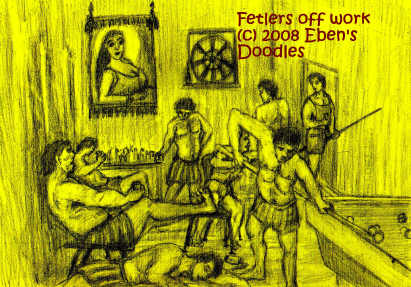
Coming in unannounced like that, the padre was right, they paid him no more attention than lounging wild beasts would of the flies buzzing around the garbage and butt cans. As for the butt cans, Damon nearly fainted as he drew his first breaths, as they were
putting out a terrific stench in the over-heated room with the tightly closed windows, not so much of cigarette ash, as urine--and just then he did see a fetler grab one, rather than bother to go to the latrine in the car, and
pay nature his respects.
Damon was weak in the knees when he at last stood outside the fetler's car,
leaning against the next as he thanked his fates for being so kind to him, as to
cross paths with a praying missionary! Where was Padre Noaik! He looked around, going into the next car, but the missionary was no where in sight. How disappointing! Damon
wanted to tell him how he had gotten some fine pictures of the fetlers, and
they would be worth a bundle when he got the negatives back to his studios and then
sold them to the Government Tourist Office.
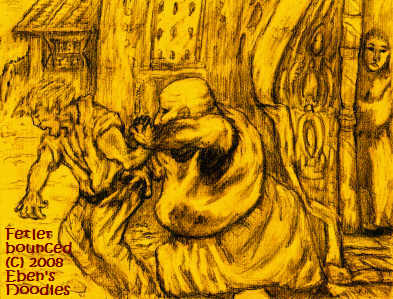
With his hand gripped on the fetler's britches, the
tavern keeper gave him a violent heave that send him flying, then bouncing and rolling across the hard ground.
Damon's blood boiled by this time, but he decided it wasn't worth risking
damage to his equipment to pound some respect into the insolent dragoman.
Besides, he was curious as to the madam of the establishment. Was she young and pretty?
Or old and diseased, with half her teeth knocked out and missing? He had to find out. That was the stock in his trade anyway: his innate curiosity, applied with
randomness, and the unexpected--sometimes the remarkable--happened, which often gave him
him his best shots.
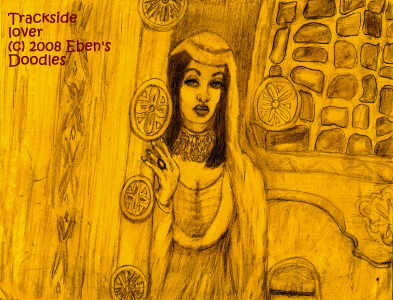
Without a word, after she looked him over from head to foot, she turned and left the door ajar, and
that was enough sign, enough invitation, and he followed her in.
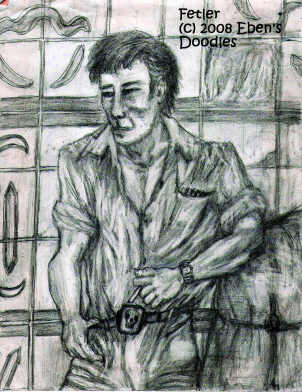
But even this fetler knew when his game was up, when he considered
what the trackside whore now had in her arsenal (not to mention the dragoman and his
dog). He soon quit trying to stare Damon down, and shrugged and made his way to the door, as slowly as he could to save his pride. His former lover wasn't going to let him strut out with his male ego intact, and followed.
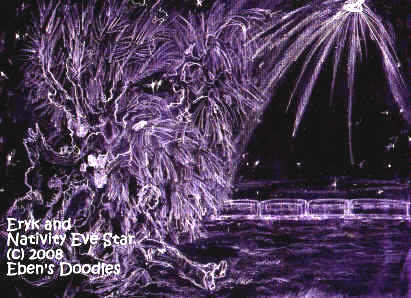
Not aware of the source of the star rays, nor caring even to look up,
the fetler was totally unaware that it was Ero, who was
glowing with a sort of St. Elmo's Fire, whether by Wally's doing or
by chance or even Y'shua's, as this could be the same Nativity Star, by
its brilliant appearance, that once shone upon his nativity in Bethlehem long
before this time (not not ever entirely forgotten by his followers).
The fetler rose, felt stiff in his legs, and wondered what was keeping the
padre so long. But just as he was going to head back to the train,
he saw someone coming--his long dust coat flapping and giving the padre
away.
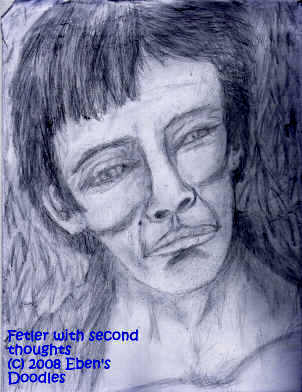
The train whistle tooted a third time, a final long blast, and then began moving slowly off.
Seeing this, the fetler suddenly made up his mind. Everything came clear
in a flash. Yep, he could do it! He could play the man and
go home and ask his papa to forgive him for badmouthing him and
stealing his papa's money he had saved up for buying special breeder bulls to
build up the herd. He would ask to be taken as a hired
man if his papa would have him. That way he wouldn't be starving, and
he could work for his living, as he knew the
work on a ranch as well as anyone.
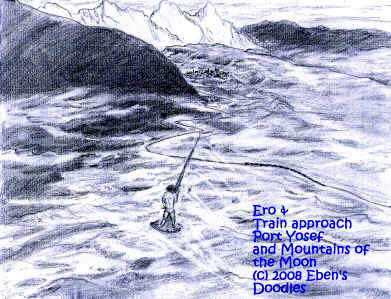
Port Yosef's walls came in sight finally of the train, but they first had to pass by the garbage dump, where the ruins of Roman antiquity, because they were judged
immoral after the conquest by Isma of the entire area, were thrown out. Theodora, a Roman empress famed for her making fortunes with her own perfumery in the palace, fared no better than the emperors' statues.
Scavenger cats lounged in her presence, where once only jeweled and perfumed courtiers of the imperial palace, with their ladies, had been allowed.
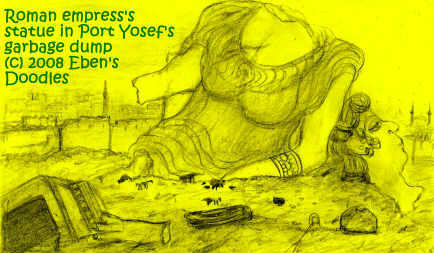
Once inside the walls of Port Yosef, the double gauge line ended at its terminus, the ornate, Multan kaliphate-era cast iron
railway station.
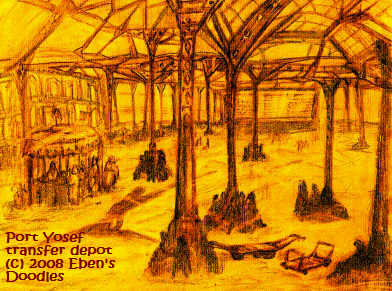
Here another single gauge line and a train, first taking on additional guards to safeguard the mail and the gold shipment from
Port Yosef (where several mines operated) to Multan, awaited all passengers and their baggage continuing on into the Mountains of the Moon. Since Ero's Kater's Compass was programmed to follow the train onward, Ero had no choice in his intinerary, except for slight alterations, which could last but a short time before the original flight plan was reinstated.
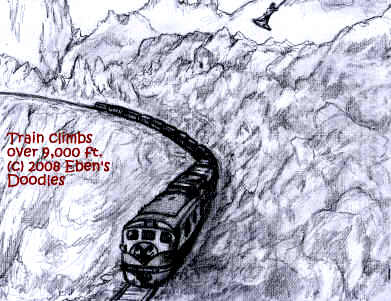
As the train climbed upwards from the plains, Ero had time to drop down to
certain vantage places to await it, as it made slow progress on the steeper grades and
the numberless switchbacks. He was overwhelmed by the sheer beauty of the Mountains of the Moon, for this was his first exposure to them. White sentinels scratching the sky, the white limestone that composed them had been thrust up from the seabed in a gigantic, violent upheaval when the continent of Atlantis was volcanically reborn.
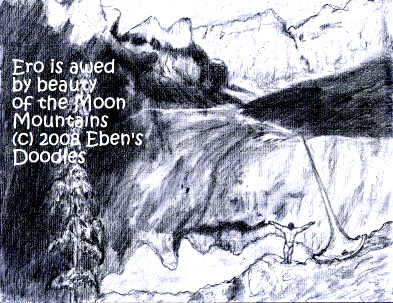
The Port Ulu to Multan Orient Express climbed laboriously the many thousands of feet to the pass as Ero followed. Beyond the pass, if an avalanche did not carry them away or destroy the track ahead, lay bandit-infested crags, that would have to be passed before they reached civilized, inhabited regions, with villages and towns that clung to the sides of the mountains like the nests of swallows.
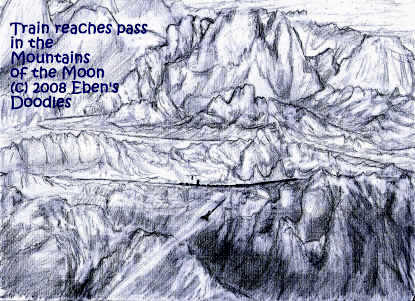
The guards get busy, however, trying to run down several stowaways. One is the laid off fetler, Eryk Woodbee from a Brazos ranch in the Pulblicatexa, who has climbed aboard, and spends time either in the unattended baggage car or on top the train, wherever he can elude detection best. As for the fetlers in their private car, he knows they want nothing to do with him--so he doesn't even try to sponge on them, as they would just throw him out if he tried.
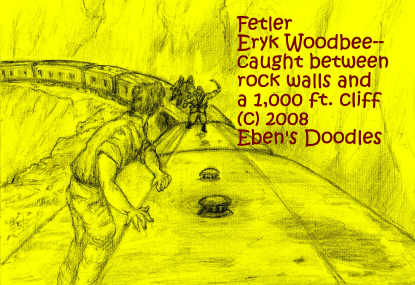
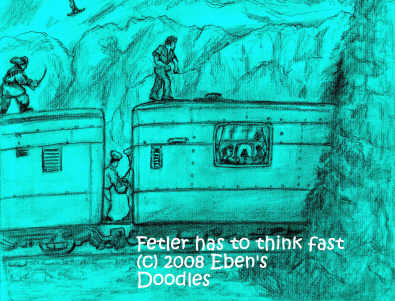
Facing a jump off the train and over a cliff, or capture and slow torture and execution in some execrement-oozing pesthole of a country prison, Eryk, sorry only that his papa
will never know what happened to him,
takes the third option left to him. He keeps standing as the train
heads toward the tunnel, which is fitted with very effective "man-guards," which have the same
function as cattle guards except that these are fatal iron spikes embedded in the
tunnel entrance and ceiling.
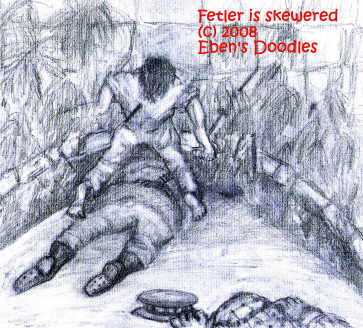
Ero, at last getting the Kater's Compass guidance system to obey his
instructions on the popup, descends and then pulls the dangling fetler off
the spike. That was the least he could do for him, he thought. But what
now? Where could he take the body? Where could he give him a decent burial?
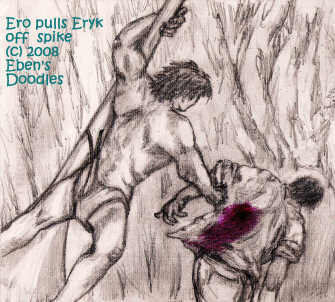
He flew up higher with Eryk aboard, and landed temporarily on a cliff edge, while he sought Help on the popup. Prompted for a name, he searched the pockets of
the fetler, and found a leather wallet, empty except for some lottery stubs,
a couple coupons for government emergency food rations issued at Port Ulu, a few
phone numbers, but no address or name. The last thing he almost threw away was only a half torn and rumpled pink slip. Reading it, he found the name and address he needed: Eryk Woodbee, Lazy W Ranchero, Brazos, Publicatexa. It was a Tea and Sugar company notice, firing the fetler, with no option of rehire.
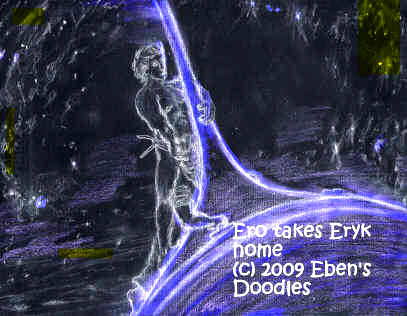
Turning west, no longer travelling north, the mast took them over the water to
the Rio Brazos and followed it up to the towering domes of the huge Ceylon Nuclear Station. Beyond the fenced reserve a few miles,
nestled among the low, dry, acacia and prickly pear-covered hills and grassed slopes, lay the Lazy W Ranchero. Here Ero set down in the dawning light of a new day, and he carried Eryk's body to an acacia and lay him gently down.
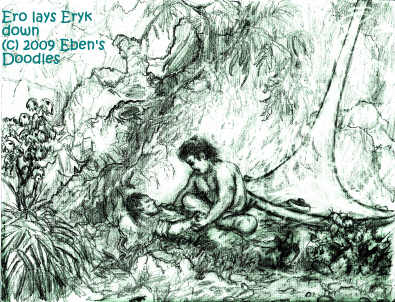
He tried to give the fetler a last
bit of dignity, his hands folded properly, and his hair
straightened, and his shirt made more neat, the best he could do for him,
and just as he did that he heard baying hounds and cattledogs. "You're home, Eryk!" he murmured. "You're home at last! They'll take care of you now. But I'm afraid your papa's heart will be broken. But at least he will know what happened to you."

PLEASE GO TO PART II OF UNCHRONICLE II, THE HOUNDS AND THE BLACK PANTHER
Retro Star Directory and Linking Page
(c) 2009, Butterfly Productions, All Rights Reserved

